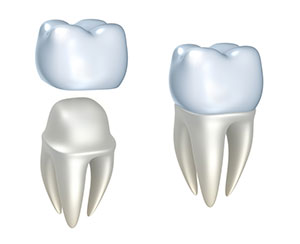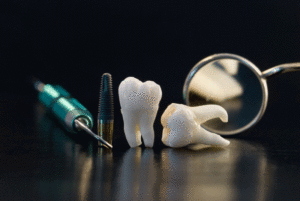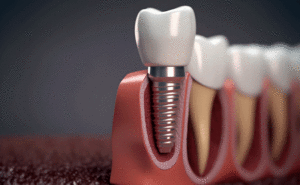Dental crowns are tooth-shaped caps that fit over a tooth to help restore its shape or size, strength and/or appearance. As one of the most common dental applications administered, they are often applied for the purpose of protecting a weakened tooth, to restore a broken or worn tooth, to help hold a bridge in place or to cover a dental implant or abnormal looking tooth.
This post will take a closer look at some of the most frequently asked questions about dental crowns:
What types of materials are crowns typically made from?
Dental crowns are commonly constructed from a variety of materials. Gold alloys, nickel and chromium are some of the more popular metals, but hardly all that are used to make crowns. Porcelain is another common material, as this material best matches the color of the natural tooth, as well as provides an alternative to metal. Porcelain fused to metal is another common material.
How long do crowns last?
Generally speaking, crowns last anywhere from five to 15 years. There are a variety of factors that can have an impact on crown life, such as your personal oral hygiene, the types of foods you eat and habits such as teeth grinding and biting your finger nails.
What’s the difference between a temporary and permanent crown?
The name says it all here. Temporary dental crowns are, essentially, only those that are fitted onto your tooth while the permanent crown is being created in a dental lab. Because a permanent crown may take several days or weeks to create, dentists will fit patients with temporary crowns that they can create right there in their office to fill the void while the permanent crown is being fabricated. Temporary crowns are typically made from acrylic or stainless steel and are best cared for by avoiding sticky and chewy foods, side flossing and by refraining from chewing on that side of your mouth until the permanent crown is fitted.
Does a crown require special care?
No, it doesn’t need to be cared for any differently than a normal tooth.
Does a crown protect the underlying tooth from decay and/or gum disease?
No it does not, and this is a common misconception that people have. Hence, it’s important to brush and floss the crowned tooth just as you would any normal tooth, especially around the gum line.
How much do dental crowns cost?
Dental crowns vary in price based on the material used and what area of the country you live in. However, generally speaking, you should expect to pay anywhere from $600 to $1,500 per crown. Furthermore, porcelain crowns are usually the most expensive. The cheapest types of crowns are usually the ones made of gold or porcelain fused to metal ones. Most dental insurance plans cover at least a portion of the crown.
For more information and more answers to frequently asked questions about dental crowns, contact our doctors, Dr. Richard Caven, Dr. Shelby Denman, and Dr. Stephen Carpenter, by calling our Caven Dental office in Jacksonville, FL, to schedule a consultation today!



